|
|
|
|
Directors' remuneration report |
The following report has been approved by the Board for agreement with shareholders.
Remuneration Committee
The objective of the Remuneration Committee (the 'Committee') is to develop
and apply remuneration strategies that drive performance and reward performance
appropriately for the Executive Directors and other senior executives.
It is also responsible for the overall remuneration policy for all employees.
The Committee has been composed entirely of Non-executive Directors, as detailed in the table below:
| Non-executive Director | Membership dates during 2003 |
| Mark Smith (chairman until 3 Nov) | 1 Jan – 3 Nov |
| George Cox (chairman from 3 Nov) | All year |
| Trevor Lewis | All year |
| Rod Kent |
All year |
| Nicholas Cosh | From 25 Nov |
| Louise Patten | From 17 Dec |
Rod Kent, Chairman of the Company, who has been a member of the Committee since 26 November 2002, will continue to attend meetings for those items other than his own arrangements but, in line with current corporate governance practice, ceased to be a member with effect from the end of January 2004.
The Group Chief Executive, Christopher Rodrigues, attends the Committee meetings for those items other than his own arrangements. In addition, a representative from Human Resources is available to provide advice.This role was undertaken by Steven Crawshaw, Managing Director, Lending & Savings in his capacity as HR Director, until 3 November 2003, and thereafter by Andrew Law, General Manager, HR and Purchasing.
The Committee receives advice from a number of sources.The Monks Partnership is the Committee's appointed independent adviser and provides no other services to the Group.Towers Perrin provide external advice to the Board and the Committee on executive compensation levels, structure and design.Towers Perrin also provide services to the Group on employee reward, retirement and administration. Mercer Human Resource Consulting are appointed as the Company's pension scheme actuaries and provide advice to the Company on its pension arrangements. In addition,Watson Wyatt Consultants provide advice to the Committee on Pensions issues.
Attendance at meetings during 2003 is recorded in the Corporate Governance section of this Annual Report & Accounts.
Remuneration policy
The Committee continues to develop a coherent set of reward policies to
incentivise performance and balance short and longer-term goals.
The resulting remuneration package comprises two broad elements:
- fixed pay, i.e. base salary and benefits including pension; and
- variable pay, i.e. one short-term incentive (bonus) and two long-term incentives (share options and performance shares).
The package is structured so that high rewards are paid only when shareholders benefit from high returns.
At the upper end of performance, when the options and performance shares vest in full, around three-quarters of the remuneration package is dependent on performance. For 'on target' performance, the variable pay element is around two-fifths of the total package.
| Total Remuneration at Target Performance |
Total Remuneration at Upper End Performance |
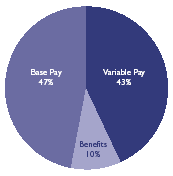 |
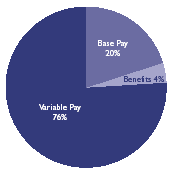 |
Wide share ownership within the Company is encouraged through the use of a savings related share option scheme and through the award of restricted shares to key, high-performing individuals. Over 3,400 employees, including Executive Directors, are currently members of the savings related share option scheme, and over 300 employees were awarded restricted shares during 2003 in recognition of their sales performance.This latter scheme, in which the shares vest over a three-year period (in equal tranches), is not available to Executive Directors.
In addition, the Company operates a Group Profit Share for all employees, subject to scheme rules.The Group Profit Share only pays out for Group performance at or above target. On-target performance delivers 3% of salary, and for performance that significantly exceeds the annual pre-tax profit targets, the maximum payment is 6%.The Group Profit Share payments for Executive Directors are included in their short-term incentive plan.
The Committee believes that the current remuneration policies have served the Company well. However, the Committee has reviewed incentive arrangements for Executive Directors and other senior employees.
After flotation, the Company wished to engender a 'one-group' culture, and therefore pursued a set of remuneration policies to incentivise business performance through group-wide schemes, such as the Group Profit Share, which was available to all staff.Whilst this general philosophy remains appropriate for Executive Directors, now that the business model pursued by the Company has matured, the Committee believes that the link between performance and reward can be better focused by allowing each major line of business to pursue tailored reward models. For example, Group Profit Share will be replaced in 2004 by specific incentive schemes for each area of the Business.
Base salary
Base salaries for Executive Directors are set at market levels.These are
typically aligned to the median of companies in the financial services
sector, taking into account individual job responsibilities and personal
performance against pre-set objectives. Salaries are reviewed annually
in April. Base salary is the only element of pay that is pensionable.
Short-term incentive
Along with around 200 other employees, Executive Directors participate
in a short-term incentive plan. For Executive Directors, the 2003 plan
pays out 40% of base salary for on-target performance, and the maximum
possible payment is 80%.The performance measures (for 2003; group profit,
business unit performance and individual key objectives) are designed
to deliver year-on-year improvements in performance. For 2004, the Committee
expects to continue to incentivise short-term performance, but intends
to review the exact form of the scheme with a view to initiating stronger
links between the short-term and long-term incentive plans.
Long-term incentives
Under the long-term incentives, approved by shareholders as part of the
flotation process, share options are granted to around 80 executives,
including Executive Directors, to encourage sustained share price and
profit growth.To reflect this, and in line with market practice, the Company's
earnings per share growth must exceed the increase in the retail price
index by at least 9% over a three year period, before the share options
can be exercised. If the performance condition has not been achieved at
the end of three years, the test may be repeated on three further consecutive
occasions, otherwise the options lapse. In 2003, Executive Directors received
option grants to the face value of their basic salary.The level of the
grant, up to the maximum of 100% of base salary, is reviewed on an annual
basis.
The definition of earnings per share ('EPS'), used to assess performance for 2003, is 'basic' EPS, which assumes earnings to be the profit of the Group after all payments, including taxation, are made.This measure was chosen as the most significant measure of overall financial performance of the Company.
A Performance Share Plan ('PSP') replaced the 1998 Long Term Incentive Plan on flotation. In order to incentivise participants, of whom there are 18 including the Executive Directors, to out-perform the competition over the longer-term, the performance measure is comparative Total Shareholder Return ('TSR'), which measures the growth in share price and re-invested dividends.The group of companies chosen for comparison is determined for each PSP award.The current group is composed of similar financial services companies (the 'comparator group'), and is:
| Abbey National | Legal & General | |
| Alliance & Leicester | Lloyds TSB | |
| Aviva | Northern Rock | |
| Barclays | Old Mutual | |
| Countrywide | Prudential | |
| Egg | Royal & Sun Alliance | |
| HBOS | Royal Bank of Scotland | |
At the commencement of each three-year performance period participants are awarded a 'standard'award up to a maximum of one times basic salary. Executive Directors may receive a 'stretch'award of up to a further one times basic salary.The level of both the standard and the stretch award, up to a combined maximum of twice salary, is reviewed on an annual basis.
Shares are released to participants depending on the level of the Company's TSR relative to the comparator group at the end of three years.There are different release criteria for the standard and stretch awards as set out in the vesting schedule (see Fig.1).
Fig.1 - Performance Share Plan Vesting Schedule
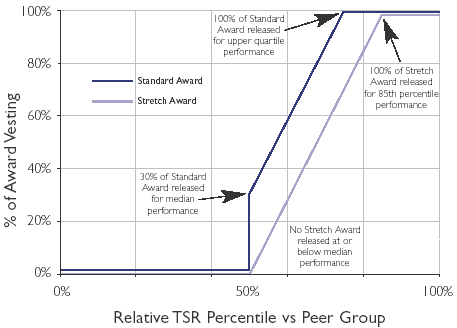
For achievement of relative three-year TSR between median and the upper threshold, vesting is on a pro-rata basis. Notwithstanding the comparative TSR performance, the Committee must also be satisfied that the underlying financial performance of the Company warrants vesting.
This vesting schedule has been adopted to reward only out-performance against the comparator group and help to ensure that there is a direct link between the level of the award and the difficulty of the performance conditions. If the performance condition is not achieved at the end of three years, the award lapses.
Future Incentive Arrangements for Executive
Directors and Members of the Executive Committee
The Committee proposes to revise its short and long-term incentive plans
for senior executives from 2004 onwards, with the aim of simplifying the
existing schemes.The proposal is to replace the current short-term incentive
plan and both of the long-term incentive plans with a single scheme that
encompasses both aspects of performance.This plan will apply to those
individuals whose personal performance has a significant impact on the
Company's results, namely the Executive Directors and the members of the
Executive Committee (approximately 25 in total).
Within this plan, up to a maximum of 60% of base salary can be paid in cash as a reward for short-term performance following the year end. The other element of the plan will be awarded as an equivalent amount of shares, as a stake in the longer-term. However, these shares will not vest for three years, and if a participant leaves the Company, they will have no automatic right to the shares. If the Company performs well, the value of the shares will be multiplied in line with pre-set performance conditions. Further details are provided in the relevant shareholder resolution in the Notice of Annual General Meeting 2004 document.
Subject to shareholder approval, the new performance-related plan will be introduced during 2004.
If shareholders approve the proposed new arrangements then the use of options will be discontinued, for all current employees, from January 2004 onwards, and no new awards will be made under the Performance Share Plan from April 2004 onwards. Appropriate transitional arrangements will operate for all employees affected by these changes.
Benefits
In line with other companies, benefits are provided in the form of a company
car (or cash allowance), private medical insurance and permanent disability
and accident insurance.
Executive Directors are members of the Company's non-contributory pension plan. This provides an accrued pension at retirement based on one-fortieth of the base salary paid over the prior twelve months ('final salary') for each year of pensionable service for Ian Darby and Robert Dickie. For Christopher Rodrigues, Rosemary Thorne and Steven Crawshaw, pension benefits accrue at one-fortieth, for service up to 31 December 2000, and at one-thirtieth thereafter.
The pension scheme provides a lump sum death-in-service benefit of the higher of four times basic salary or four times earnings in the previous tax year, together with spouse and dependants' pensions.
The pension arrangements for all employees, including Executive Directors, are currently under review.This review includes consideration of retirement dates.
Contracts
In line with Group policy, all Executive Directors have service contracts
that expire at their respective normal retirement age, but the Company
has the right to give 12 months' notice of termination (or payment in
lieu) and the Director may give 6 months' notice.
Executive Directors receive a maximum of 12 months' basic salary and other benefits in the event of the Company terminating the contract without notice for any reason other than gross misconduct (when there will be no compensation).The date of each service contract and the age of each current Executive Director (as at 31 December 2003) are shown below.
| Executive Director | Age at 31 December 2003 |
Date of service contract |
| Christopher Rodrigues | 54 | 3 June 1996 |
| Rosemary Thorne | 51 | 29 November 1999 |
| Steven Crawshaw | 42 | 6 April 1999 |
| Robert Dickie |
44 | 31 December 2002 |
| Ian Darby | 40 | 3 December 1984 |
Non-executive Directors
Market level fees for the Non-executive Directors are determined by a
Committee of Executive Directors, the current membership being Christopher
Rodrigues, Rosemary Thorne and Steven Crawshaw.Towers Perrin provide independent
advice on best practice and market fee levels, taking into account the
responsibilities and time commitment of each Non-executive Director.
The Non-executive Directors do not participate in any incentive arrangements and none of them have a service contract. Each receives a letter of engagement indicating that their initial term of appointment will be three years.
With one exception, Non-executive Directors do not receive any other benefit.Trevor Lewis joined the Board in 1990 and was entitled to participate in the Company's private medical insurance arrangements and the pension plan. This provided for a pension based on his final basic fee (including that received as Chairman of Bradford & Bingley Pensions Limited) at an accrual rate of one-thirtieth for each year of pensionable service subject to the Inland Revenue earnings cap. He contributes 5% of his fee to the plan.Trevor Lewis retired from the Board on the 31 December 2003.These pension arrangements do not apply to any Non-executive Director who joined the Board after 1990.
Non-executive directorships
Executive Directors who hold non-executive directorships in other companies
are permitted to retain their earnings from these posts.
Performance graph
In accordance with the Directors' Remuneration Report Regulations 2002
('the Regulations'), Fig. 2 shows Bradford & Bingley's TSR compared with
the companies comprising the FTSE 100 for the period from flotation on
4 December 2000 to 31 December 2003. Whilst the FTSE 100 Return Index
(of which Bradford & Bingley is a constituent member) has been selected
for the purposes of the Regulations to assist shareholders with inter-company
comparison, the Board considers the comparator group used for the PSP
(described above) to be a more appropriate competitive
performance measure for determining the remuneration of the executive
population and has therefore included an additional graph (Fig. 3).
Fig.2 - Historical TSR Performance
Growth in the value of a hypothetical £100 holding over period since listing FTSE 100 comparison based on spot values
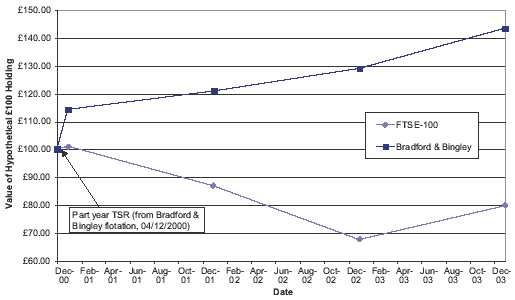
Fig.3 - Historical TSR Performance
Growth in the value of a hypothetical £100 holding over period since listing LTIP comparator group comparison based on spot values
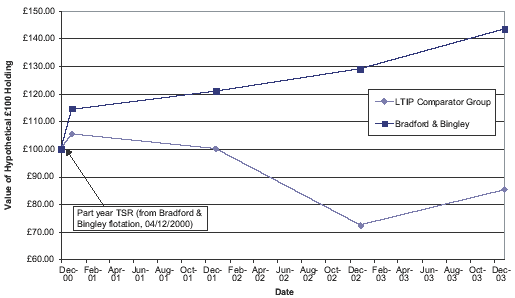
Compliance
This report describes the design and structure of our remuneration policies and the tables following show how these have been applied to each individual Director in the year under review.These tables (see below) have been audited in compliance with the Directors' Remuneration Report Regulations 2002.
We also confirm that the Company complies with the Combined Code ('the Code') appended to the Listing Rules of the UK Listing Authority issued in June 1998 and with section 1B of the Code's provisions on Directors' remuneration and Schedule B to the Code in respect of the content of the Directors' Remuneration Report.
Directors' emoluments for
the year ended 31 December 2003
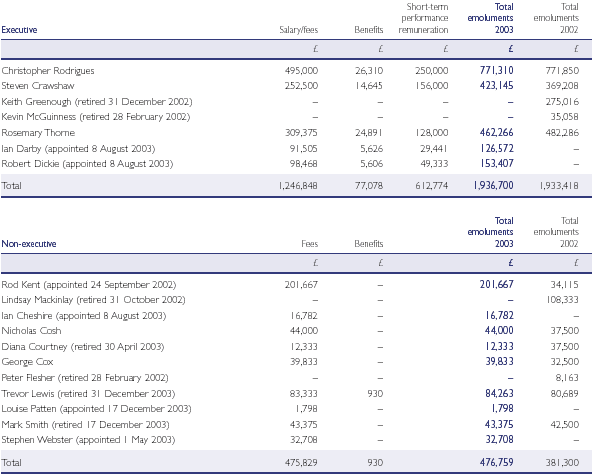

Notes
Short-term performance remuneration shown above reflects amounts payable
in respect of 2003 performance.Taxable benefits received by Directors
consist principally of the provision of a company car, health benefits
and housing allowance as appropriate.
Directors' pensions
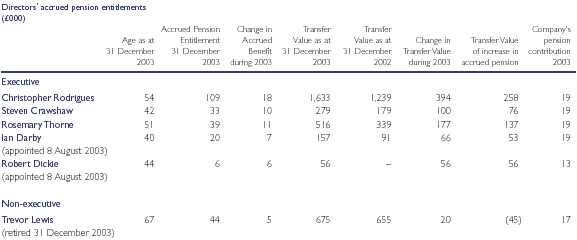
Notes
Pension disclosures are reported above in accordance with Directors' Remuneration
Report Regulations 2002.The transfer values reported above reflect the
capital value of the relevant pension assessed under market conditions
at the end of 2003 and 2002 respectively.The increase in accrued pension
entitlement represents the change in the annual pension to which each
Director is entitled as a result of changes in pensionable earnings, excluding
inflation, and increases in pensionable service.
The amounts in respect of the Company's pension contribution for Ian Darby and Robert Dickie reflect entitlements, not only for their time as a Director, but for the whole of 2003.
Directors' share option grants
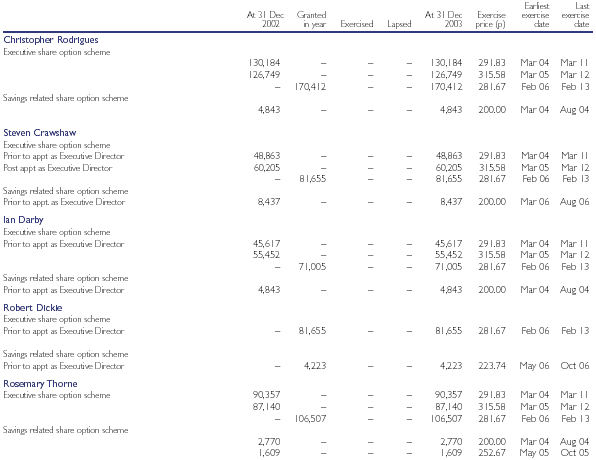
Notes
The exercises of share options are subject to a performance condition
related to the improvement in the Company's earnings per share
The aggregate value of gains on options made by Executive Directors in
2003 was £Nil (2002: £Nil).
Directors' performance share plan awards
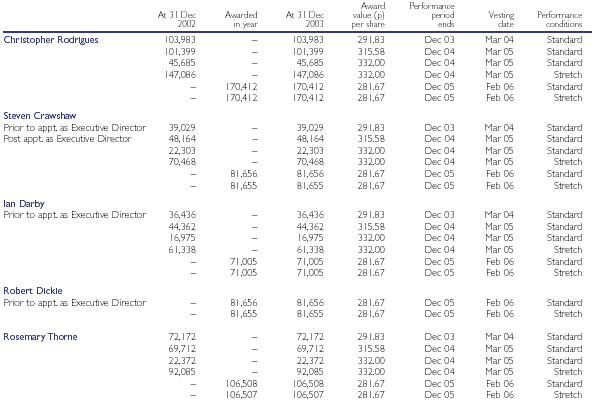
Notes
Performance Share Plan awards are subject to the achievement of a performance
criterion which measures the Company's TSR against a peer group of companies.
For description see the Directors' Remuneration Report.
Directors' 1998 long-term incentive plan - share award*

Notes
*No awards have been made under this plan since December 2000.
**Prior to appointment as Executive Director.
Long-Term Incentive Plan participants were entitled to choose cash or
shares.
Where shares were chosen, nil cost options were granted. However, in order
to receive these options participants sacrificed cash entitlements equivalent
to 249.35p per share.
Notes to Directors' Remuneration Report tables
The performance period for the 2001 allocation made under the 2000 Performance Share Plan ended on the 31st December 2003. Full details concerning any shares released to Executive Directors in 2004 will be contained in the Annual Report & Accounts for 2004. Additionally, under the 2001 share option award, the EPS performance measure was met and as such the options will become exercisable from 8 March 2004.
On 31 December 2003 the closing market price of ordinary shares in Bradford & Bingley plc was 305p and the range during the year to 31 December 2003 was 245p to 356.5p
Approved by the Board on 16 February 2004 and signed on its behalf by:
George Cox
Chairman of the Remuneration Committee